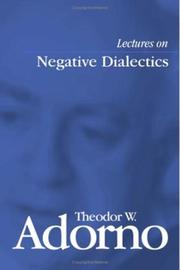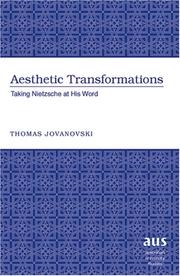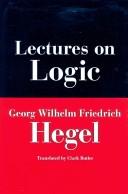| Listing 1 - 10 of 41 | << page >> |
Sort by
|
Book
ISBN: 1412362814 Year: 2008 Publisher: [Place of publication not identified] : J.-M. Tremblay,
Abstract | Keywords | Export | Availability | Bookmark
 Loading...
Loading...Choose an application
- Reference Manager
- EndNote
- RefWorks (Direct export to RefWorks)
Polyandry. --- Dialectic.
Book
ISBN: 3938286369 9783938286364 Year: 2008 Publisher: Nürnberg: Antogo,
Abstract | Keywords | Export | Availability | Bookmark
 Loading...
Loading...Choose an application
- Reference Manager
- EndNote
- RefWorks (Direct export to RefWorks)
Ernst Bloch war ein dialektischer Denker, der allerdings das traditionelle Verständnis von Dialektik erweitert hat. Das Thema Polyphone Dialektik knüpft an seine mehrzeitliche und mehrräumige Dialektik an, beleuchtet eine Dialektikkonzeption, die als "unsauber", als "widerständig" bezeichnet wurde. Die in diesem Band versammelten Beiträge widmen sich einer vielstimmigen Auffassung von Dialektik, wobei Einigkeit darüber besteht, dass der Weltprozess nur dialektisch adäquat begriffen werden kann. Nicht nur Blochsche Philosopheme im engeren Sinn werden diskutiert, wie sein "spekulativer Materialismus", sondern auch die Dialektik gesellschaftlicher Praxis, (natur)wissenschaftliche Aspekte und Fragen des gegenwärtigen Informations- und Medienzeitalters.

ISBN: 9780745635095 9780745635101 Year: 2008 Publisher: Cambridge Polity press
Abstract | Keywords | Export | Availability | Bookmark
 Loading...
Loading...Choose an application
- Reference Manager
- EndNote
- RefWorks (Direct export to RefWorks)
Dialectic --- Philosophy --- Adorno, Theodor W.,
Book
ISBN: 9783518294772 3518294776 Year: 2008 Publisher: Frankfurt am Main : Suhrkamp,
Abstract | Keywords | Export | Availability | Bookmark
 Loading...
Loading...Choose an application
- Reference Manager
- EndNote
- RefWorks (Direct export to RefWorks)
Ontology. --- Dialectic. --- Ontologie --- Dialectique --- Heidegger, Martin,
Book
ISBN: 1281728772 9780300138030 9786611728779 0300138032 Year: 2008 Publisher: New Haven, CT : Yale University Press
Abstract | Keywords | Export | Availability | Bookmark
 Loading...
Loading...Choose an application
- Reference Manager
- EndNote
- RefWorks (Direct export to RefWorks)
Among Plato's later dialogues, the Parmenides is one of the most significant. Not only a document of profound philosophical importance in its own right, it also contributes to the understanding of Platonic dialogues that followed it, and it exhibits the foundations of the physics and ontology that Aristotle offered in his Physics and Metaphysics VII. In this book, R.E. Allen provides a superb translation of the Parmenides along with a structural analysis that procedes on the assumption that formal elements, logical and dramatic, are important to its interpretation and that the argument of the Parmenides is aporetic, a statement of metaphysical perplexities. Allen's original translation of and commentary on the Parmenides were published in 1983 to great acclaim and have now been revised by the author.

ISBN: 9780820420028 Year: 2008 Volume: 204 Publisher: Frankfurt am Main [etc.] Peter Lang
Abstract | Keywords | Export | Availability | Bookmark
 Loading...
Loading...Choose an application
- Reference Manager
- EndNote
- RefWorks (Direct export to RefWorks)
Aesthetics --- Dialectic. --- Methodology. --- History. --- Nietzsche, Friedrich Wilhelm, --- Socrates. --- Socrates --- Aesthetics.

ISBN: 9780253351678 Year: 2008 Publisher: Bloomington, Ind. Indiana University Press
Abstract | Keywords | Export | Availability | Bookmark
 Loading...
Loading...Choose an application
- Reference Manager
- EndNote
- RefWorks (Direct export to RefWorks)
Logic --- Argumentation --- Deduction (Logic) --- Deductive logic --- Dialectic (Logic) --- Logic, Deductive --- Intellect --- Philosophy --- Psychology --- Science --- Reasoning --- Thought and thinking --- Methodology
Book
ISBN: 9780521887748 0521887747 9780511575464 9781108823845 0511464711 9780511464713 9780511465451 0511465459 0511462387 9780511462382 0511575467 110720089X 1281982873 9786611982874 0511463189 0511463979 110882384X Year: 2008 Publisher: Cambridge: Cambridge university press,
Abstract | Keywords | Export | Availability | Bookmark
 Loading...
Loading...Choose an application
- Reference Manager
- EndNote
- RefWorks (Direct export to RefWorks)
'Dialogue' was invented as a written form in democratic Athens and made a celebrated and popular literary and philosophical style by Plato. Yet it almost completely disappeared in the Christian empire of late antiquity. This book, a general and systematic study of the genre in antiquity, asks: who wrote dialogues and why? Why did dialogue no longer attract writers in the later period in the same way? Investigating dialogue goes to the heart of the central issues of power, authority, openness and playfulness in changing cultural contexts. This book analyses the relationship between literary form and cultural authority in a new and exciting way, and encourages closer reflection about the purpose of dialogue in its wider social, cultural and religious contexts in today's world.
Dialogue. --- Philosophy, Ancient. --- Church history. --- Dialogue --- Religious aspects. --- Dialectic. --- Church history --- Dialectic --- Philosophy, Ancient --- Ancient philosophy --- Greek philosophy --- Philosophy, Greek --- Philosophy, Roman --- Roman philosophy --- Dialog --- Drama --- Polarity --- Polarity (Philosophy) --- Christianity --- Ecclesiastical history --- History, Church --- History, Ecclesiastical --- History --- Religious aspects --- Arts and Humanities --- Dialogue - Religious aspects.
Multi
ISBN: 9780521886178 9780521713801 0521886171 0521713803 9780511808630 0511409354 9780511409356 9780511409899 0511409893 9780511407994 0511407998 0511808631 9786611717063 6611717064 1107086574 1107186692 1281717061 0511407254 0511408781 9781107086579 9781107186699 9781281717061 9780511407253 9780511408786 Year: 2008 Publisher: Cambridge Cambridge University Press
Abstract | Keywords | Export | Availability | Bookmark
 Loading...
Loading...Choose an application
- Reference Manager
- EndNote
- RefWorks (Direct export to RefWorks)
Second edition of the introductory guidebook to the basic principles of constructing sound arguments and criticising bad ones. Non-technical in approach, it is based on 186 examples, which Douglas Walton, a leading authority in the field of informal logic, discusses and evaluates in clear, illustrative detail. Walton explains how errors, fallacies, and other key failures of argument occur. He shows how correct uses of argument are based on sound strategies for reasoned persuasion and critical responses. This edition takes into account many developments in the field of argumentation study that have occurred since 1989, many created by the author. Drawing on these developments, Walton includes and analyzes 36 new topical examples and also brings in work on argumentation schemes. Ideally suited for use in courses in informal logic and introduction to philosophy, this book will also be valuable to students of pragmatics, rhetoric, and speech communication.
Logic --- Logique --- Raisonnement --- Argumentation --- Logic. --- Reasoning. --- Reasoning --- Ratiocination --- Reason --- Thought and thinking --- Judgment (Logic) --- Deduction (Logic) --- Deductive logic --- Dialectic (Logic) --- Logic, Deductive --- Intellect --- Philosophy --- Psychology --- Science --- Methodology --- Logique. --- Raisonnement. --- Argumentation. --- Arts and Humanities
Book
ISSN: 02910489 ISBN: 9782130571391 2130571395 Year: 2008 Publisher: Paris: PUF,
Abstract | Keywords | Export | Availability | Bookmark
 Loading...
Loading...Choose an application
- Reference Manager
- EndNote
- RefWorks (Direct export to RefWorks)
La pensée occidentale est en crise, tant dans sa rationalité que dans valeurs. Si elle connaît aujourd'hui une problématisation aussi profonde, c'est que son fondement même s'est écroulé. La problématisation, qu'on le veuille ou non, est devenue notre destin, la nécessité incontournable qu'il faudra bien théoriser. Depuis plusieurs siècles, le Cogito était considéré comme le fondement ultime de la pensée et incarnait le modèle formel de toute réponse. La conscience, en cessant d'être ainsi l'originaire de la rationalité occidentale, a cédé peu à peu la place à des remises en question de plus en plus radicales, oscillant entre le nihilisme, avec son culte de l'indicible, et le scientisme, avec son espérance de voir la science tout résoudre par sa rigueur et ses résultats. La philosophie du questionnement prend donc la problématicité des êtres et des choses comme nouveau point de départ, comme une positivité à concevoir comme telle. Elle met en forme la diversité interrogative, en la pensant non plus comme un mal, mais comme la nature même de la pensée. Entre Socrate, qui questionnait sans répondre, et Platon, qui répondait sans plus se soucier du questionnement, la problématologie ouvre une troisième voie. Mais pour saisir sa propre émergence, elle doit d'abord se pencher sur l'histoire de sa propre impossibilité jusqu'à aujourd'hui, et en étudier les expressions de substitution, au travers des grandes philosophies. Car philosopher, c'est questionner, même si cela n'a pas consisté pour ces pensées à questionner le questionnement.
Philosophy --- Language and languages --- Science --- Dialectic --- Logic --- Questioning --- Dialectique --- Langage et langues --- Sciences --- Logique --- Interrogation --- Philosophie --- Philosophie des sciences --- Language and languages - Philosophy --- Science - Philosophy --- Philosophie du langage --- Questionnement
| Listing 1 - 10 of 41 | << page >> |
Sort by
|

 Search
Search Feedback
Feedback About UniCat
About UniCat  Help
Help News
News